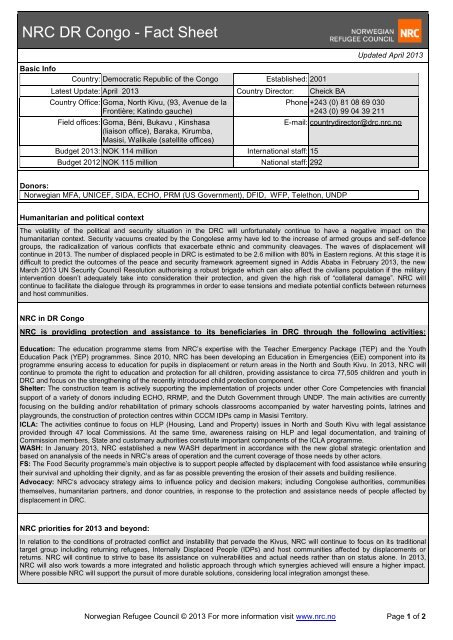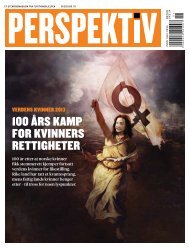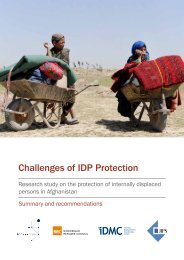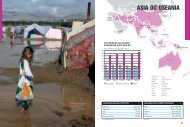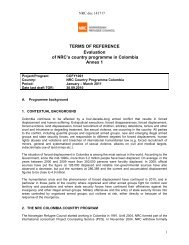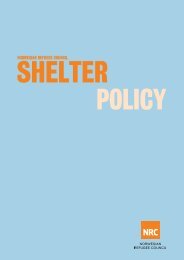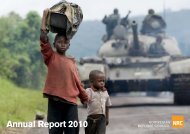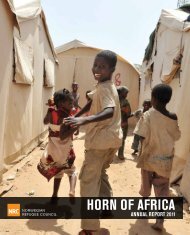NRC DR Congo - Fact Sheet - Norwegian Refugee Council
NRC DR Congo - Fact Sheet - Norwegian Refugee Council
NRC DR Congo - Fact Sheet - Norwegian Refugee Council
Create successful ePaper yourself
Turn your PDF publications into a flip-book with our unique Google optimized e-Paper software.
<strong>NRC</strong> <strong>DR</strong> <strong>Congo</strong> - <strong>Fact</strong> <strong>Sheet</strong><br />
Basic Info<br />
Country: Democratic Republic of the <strong>Congo</strong> Established: 2001<br />
Latest Update: April 2013 Country Director: Cheick BA<br />
Country Office: Goma, North Kivu, (93, Avenue de la<br />
Frontière; Katindo gauche)<br />
Field offices: Goma, Béni, Bukavu , Kinshasa<br />
(liaison office), Baraka, Kirumba,<br />
Masisi, Walikale (satellite offices)<br />
Budget 2013: NOK 114 million International staff: 15<br />
Budget 2012 NOK 115 million National staff: 292<br />
Phone +243 (0) 81 08 69 030<br />
+243 (0) 99 04 39 211<br />
Updated April 2013<br />
E-mail: countrydirector@drc.nrc.no<br />
Donors:<br />
<strong>Norwegian</strong> MFA, UNICEF, SIDA, ECHO, PRM (US Government), DFID, WFP, Telethon, UNDP<br />
Humanitarian and political context<br />
The volatility of the political and security situation in the <strong>DR</strong>C will unfortunately continue to have a negative impact on the<br />
humanitarian context. Security vacuums created by the <strong>Congo</strong>lese army have led to the increase of armed groups and self-defence<br />
groups, the radicalization of various conflicts that exacerbate ethnic and community cleavages. The waves of displacement will<br />
continue in 2013. The number of displaced people in <strong>DR</strong>C is estimated to be 2.6 million with 80% in Eastern regions. At this stage it is<br />
difficult to predict the outcomes of the peace and security framework agreement signed in Addis Ababa in February 2013, the new<br />
March 2013 UN Security <strong>Council</strong> Resolution authorising a robust brigade which can also affect the civilians population if the military<br />
intervention doesn’t adequately take into consideration their protection, and given the high risk of “collateral damage”. <strong>NRC</strong> will<br />
continue to facilitate the dialogue through its programmes in order to ease tensions and mediate potential conflicts between returnees<br />
and host communities.<br />
<strong>NRC</strong> in <strong>DR</strong> <strong>Congo</strong><br />
<strong>NRC</strong> is providing protection and assistance to its beneficiaries in <strong>DR</strong>C through the following activities:<br />
Education: The education programme stems from <strong>NRC</strong>’s expertise with the Teacher Emergency Package (TEP) and the Youth<br />
Education Pack (YEP) programmes. Since 2010, <strong>NRC</strong> has been developing an Education in Emergencies (EiE) component into its<br />
programme ensuring access to education for pupils in displacement or return areas in the North and South Kivu. In 2013, <strong>NRC</strong> will<br />
continue to promote the right to education and protection for all children, providing assistance to circa 77,505 children and youth in<br />
<strong>DR</strong>C and focus on the strengthening of the recently introduced child protection component.<br />
Shelter: The construction team is actively supporting the implementation of projects under other Core Competencies with financial<br />
support of a variety of donors including ECHO, RRMP, and the Dutch Government through UNDP. The main activities are currently<br />
focusing on the building and/or rehabilitation of primary schools classrooms accompanied by water harvesting points, latrines and<br />
playgrounds, the construction of protection centres within CCCM IDPs camp in Masisi Territory.<br />
ICLA: The activities continue to focus on HLP (Housing, Land and Property) issues in North and South Kivu with legal assistance<br />
provided through 47 local Commissions. At the same time, awareness raising on HLP and legal documentation, and training of<br />
Commission members, State and customary authorities constitute important components of the ICLA programme.<br />
WASH: In January 2013, <strong>NRC</strong> established a new WASH department in accordance with the new global strategic orientation and<br />
based on ananalysis of the needs in <strong>NRC</strong>’s areas of operation and the current coverage of those needs by other actors.<br />
FS: The Food Security programme’s main objective is to support people affected by displacement with food assistance while ensuring<br />
their survival and upholding their dignity, and as far as possible preventing the erosion of their assets and building resilience.<br />
Advocacy: <strong>NRC</strong>‘s advocacy strategy aims to influence policy and decision makers; including <strong>Congo</strong>lese authorities, communities<br />
themselves, humanitarian partners, and donor countries, in response to the protection and assistance needs of people affected by<br />
displacement in <strong>DR</strong>C.<br />
<strong>NRC</strong> priorities for 2013 and beyond:<br />
In relation to the conditions of protracted conflict and instability that pervade the Kivus, <strong>NRC</strong> will continue to focus on its traditional<br />
target group including returning refugees, Internally Displaced People (IDPs) and host communities affected by displacements or<br />
returns. <strong>NRC</strong> will continue to strive to base its assistance on vulnerabilities and actual needs rather than on status alone. In 2013,<br />
<strong>NRC</strong> will also work towards a more integrated and holistic approach through which synergies achieved will ensure a higher impact.<br />
Where possible <strong>NRC</strong> will support the pursuit of more durable solutions, considering local integration amongst these.<br />
<strong>Norwegian</strong> <strong>Refugee</strong> <strong>Council</strong> © 2013 For more information visit www.nrc.no Page 1 of 2
<strong>NRC</strong> core activities in the <strong>DR</strong> <strong>Congo</strong>:<br />
EDUCATION<br />
In 2013, <strong>NRC</strong> is implementing TEP (Teacher Emergency Package), YEP (Youth Education Pack) and EiE (Education in Emergency)<br />
projects promoting access to education and protection for all children. A total of 23,389 beneficiaries have already been reached with<br />
funding from the <strong>Norwegian</strong> MFA, SIDA, ECHO, PRM, UNICEF and Pooled Fund. Among these beneficiaries are 750 learners<br />
enrolled in YEP programs and 178 teachers who have received training. More than 1,000 parents and local authorities have been<br />
sensitized on the importance of education, child protection and their active participation to promote children’s rights. <strong>NRC</strong> recently<br />
started two new EiE projects funded by ECHO and Pooled Fund in North and South Kivu territories targeting over 15,000 children.<br />
Since January, <strong>NRC</strong> has already built 10 classrooms in two Temporary Learning Spaces in Masisi, and the construction of 33<br />
additional classrooms (5 schools) began in March.<br />
SHELTER<br />
In 2013, <strong>NRC</strong> will support the construction of at least 54 and 12 classrooms (with accompanying latrines, water harvesting points, and<br />
playgrounds) for primary schools in North Kivu and South Kivu respectively, as well as the construction of 2 protection centres. 6<br />
classrooms (+ 12 latrines) and 1 water harvesting system are already under construction and the work will be completed by the end of<br />
April 2013 in North Kivu. In South Kivu, <strong>NRC</strong> is currently assessing plots and sensitizing and mobilizing community members for the<br />
construction of the schools. Funds for those activities are currently made available by a number of donors including ECHO, Pooled<br />
Funds, RRMP, and the Dutch Government through UNDP.<br />
ICLA (Information, Counseling, and Legal Assistance)<br />
ICLA activities focus on the dissemination of knowledge on HLP (Housing, Land and Property), inheritance rights, civil documentation<br />
relevance, and IDP Guiding Principles in North and South Kivu. In 2013, ICLA will continue its material support to existing<br />
Commissions as well as building the capacity of their members. In addition, ICLA will establish 5 new commissions in North and South<br />
Kivu, address around 1.800 land conflicts through mediation, conduct information campaigns, and support 2 local NGOs engaged in<br />
ICLA actions.<br />
WASH (Water, Sanitation and Hygiene Promotion):<br />
In 2013, <strong>NRC</strong> is establishing a new WASH department with funds from NMFA and hopes to be one of the main actors in the sector by<br />
the end of the year. Recruitment of technical staff is coming to a close and a rapid assessment in Masisi Territory and other return<br />
areas of IDPs in North Kivu is being conducted.<br />
FOOD SECURITY<br />
With the situation existing in Eastern <strong>DR</strong>C, characterized by areas of increased stability and others of continued insecurity and<br />
displacement, the <strong>NRC</strong> Food Security strategy for 2013 is based on a mixed approach. In areas of improved security and population<br />
returns, <strong>NRC</strong> places focus on stimulating the recovery of land and market access while promoting crop production, helping the most<br />
vulnerable to regain appropriate livelihoods and avoid negative coping mechanisms bearing long-term consequences. In South Kivu,<br />
up to March 2013, 1.500 households had been identified and trained on IGA. In North Kivu, <strong>NRC</strong> will implement livelihoods activities<br />
for the third and final year of a DfID-funded project targeting 4.800 households. In areas of continued or new displacement where<br />
alternatives are not available, emergency food interventions continue to be necessary in order to save lives and protect basic assets.<br />
To do so, <strong>NRC</strong> decided to specialize in Cash & Voucher approaches for food assistance: up to March 2013, <strong>NRC</strong> had assisted 20.332<br />
individuals with ECHO funding and for the rest of the 2013, <strong>NRC</strong> forecasts to assist circa 56.550 individuals with support from ECHO<br />
and NMFA.<br />
RRMP (Rapid Response mechanism to Movements of Population)<br />
<strong>NRC</strong>’s RRMP, the biggest emergency and multi sector project in Eastern <strong>DR</strong>C, is funded by UNICEF. Its main objectives are to<br />
ensure humanitarian surveillance with assessments conducted in areas of massive displacements and to assist people affected by<br />
such displacement. In 2012, <strong>NRC</strong>’s teams have conducted 93 MSA for an estimated total population of 1,752,454 individuals resulting<br />
in assistance being provided to over 200,000 beneficiaries. The assistance included NFI distributions and fairs, emergency education<br />
and protection (catch up classes and school vouchers), and construction/rehabilitation of schools and latrines. For the 4 th year of the<br />
RRMP (2013-2014), <strong>NRC</strong>’s capacity (and available budget) amounts to 105 MSA, NFI assistance to 145,000 beneficiaries (29,000<br />
households), and education and protection to the 28,050 students in 85 schools (44 of which will benefit from construction works).<br />
RRR (Return Reintegration and Recovery)<br />
In March 2013, <strong>NRC</strong> started a project funded by the Dutch Government through UNDP, which contributes to the International Security<br />
Stabilisation Support Strategy (I4S). <strong>NRC</strong>’s project focuses on the 4 th objective of the I4S, ‘Return, Reintegration and Recovery” or<br />
RRR and it covers a period of 20 months. The RRR project aims at promoting and supporting voluntary return of displaced population<br />
to their areas of origin. 1,800 shelters and over 10 community structures will be built and handed over to selected beneficiaries and<br />
communities in Petit North Kivu Province (i.e. Masisi and Rutshuru). The ICLA programme will be empowered to support the<br />
verification of land ownership and to mediate potential land issues and conflicts. <strong>NRC</strong> will also build and run a YEP centre in South<br />
Kivu Province (i.e. Bunyakiri) for the vocational training of 300 youths. The project is implemented through a community and<br />
participatory based approach and in close coordination with all <strong>NRC</strong> core competences.<br />
<strong>Norwegian</strong> <strong>Refugee</strong> <strong>Council</strong> © 2013 For more information visit www.nrc.no Page 2 of 2


